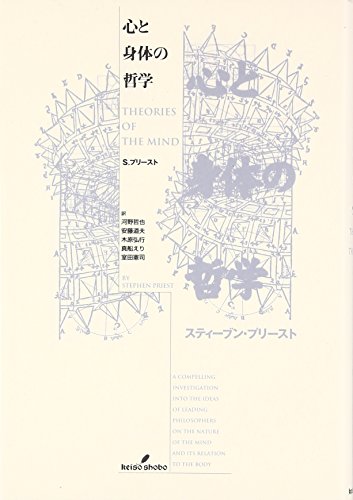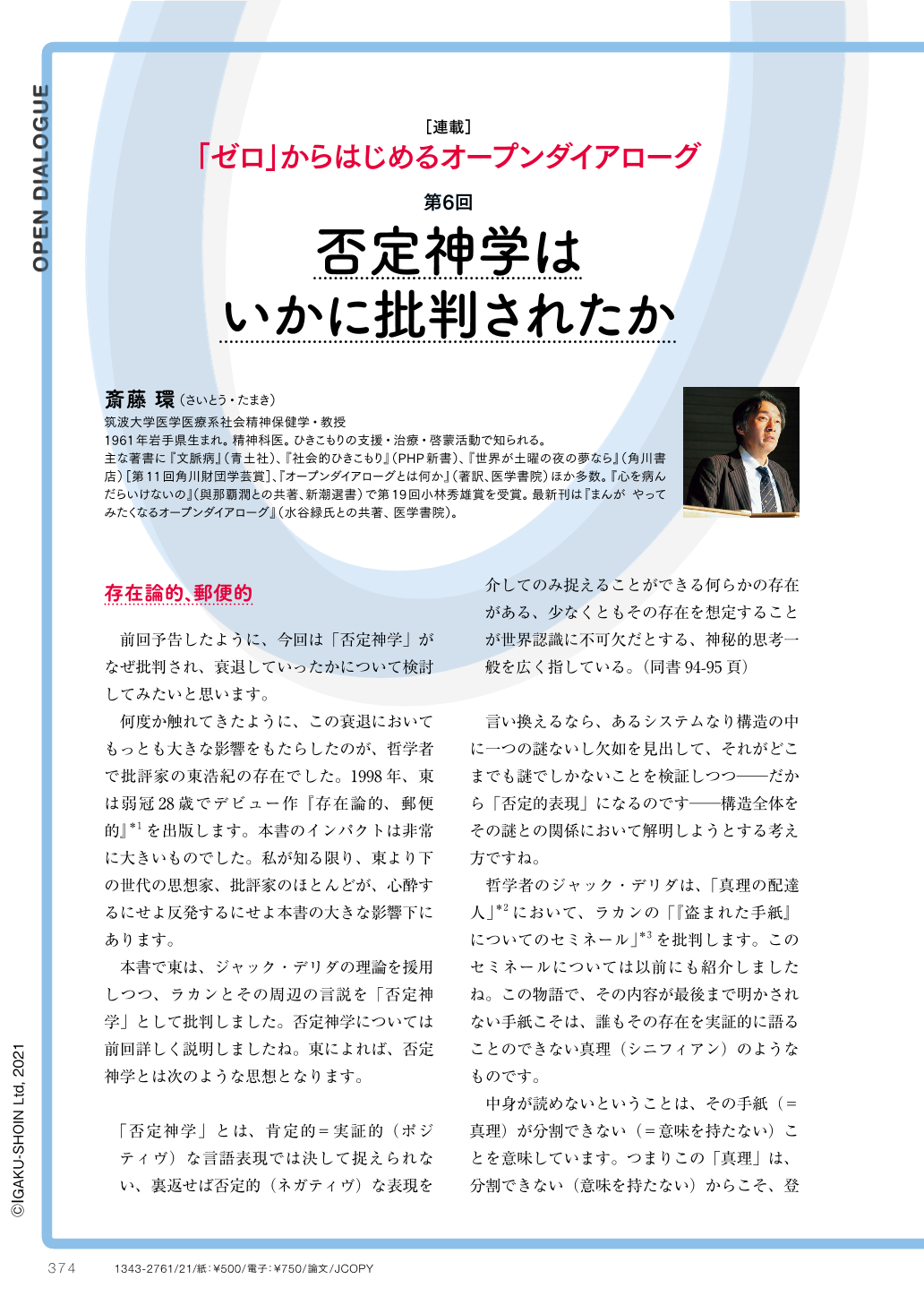1 0 0 0 OA 人口と集中を抑制する新しい文化について
- 著者
- 河野 哲也
- 出版者
- 日本哲学会
- 雑誌
- 哲学 (ISSN:03873358)
- 巻号頁・発行日
- vol.2020, no.71, pp.32-44, 2020-04-01 (Released:2020-05-12)
- 著者
- 渡邊 裕一
- 出版者
- 東洋大学国際哲学研究センター
- 雑誌
- 国際哲学研究 = Journal of international philosophy (ISSN:21868581)
- 巻号頁・発行日
- no.8, pp.75-86, 2019-03
1 0 0 0 IR ロックの政治論 : 抵抗権について
- 著者
- 菊地 慧 キクチ サトシ Kikuchi Satoshi
- 出版者
- 弘前大学哲学会
- 雑誌
- 哲学会誌 (ISSN:02870886)
- 巻号頁・発行日
- no.40, pp.45-51, 2006-03-31
1 0 0 0 IR 他者の産出と自己の誕生肯定 : 森岡正博の「誕生肯定」概念の批判的検討
- 著者
- 居永 正宏
- 出版者
- 現代生命哲学研究所 = Research Institute for Contemporary Philosophy of Life
- 雑誌
- 現代生命哲学研究
- 巻号頁・発行日
- no.1, pp.46-68, 2012-03
1 0 0 0 IR 「産み」の哲学に向けて(1) : 先行研究レビューと基本的な論点の素描
- 著者
- 居永 正宏
- 出版者
- 大阪府立大学21世紀科学研究機構現代生命哲学研究所
- 雑誌
- 現代生命哲学研究
- 巻号頁・発行日
- no.3, pp.88-108, 2014-03
1 0 0 0 OA 実体間の「関係」を反省する ライプニッツのモナド論的反省
- 著者
- 松田 毅
- 出版者
- 日本哲学会
- 雑誌
- 哲学 (ISSN:03873358)
- 巻号頁・発行日
- vol.1993, no.43, pp.112-122, 1993-04-01 (Released:2009-07-23)
- 参考文献数
- 15
1 0 0 0 日本神話に見る生と死 (生と死の思想<特集>)
- 著者
- 上田 賢治
- 出版者
- 東洋哲学研究所
- 雑誌
- 東洋学術研究 (ISSN:02876086)
- 巻号頁・発行日
- vol.27, no.2, pp.p48-62, 1988-08
- 著者
- 河野 哲也
- 出版者
- 三田哲學會
- 雑誌
- 哲学 (ISSN:05632099)
- 巻号頁・発行日
- no.104, pp.65-70, 1999-12
訳書紹介
1 0 0 0 心と身体の哲学
- 著者
- S.プリースト著 河野哲也 [ほか] 訳
- 出版者
- 勁草書房
- 巻号頁・発行日
- 1999
1 0 0 0 IR 非法則論的一元論とエピフェノメナリズム (シンポジウム 心身問題)
- 著者
- 柴田 正良
- 出版者
- 中部哲学会
- 雑誌
- 中部哲学会紀要 (ISSN:09149015)
- 巻号頁・発行日
- no.28, pp.29-41, 1996-03
1 0 0 0 IR 教育史を見直す
- 著者
- 新谷 恭明
- 出版者
- 九州大学大学院人間環境学府教育哲学・教育社会史研究室
- 雑誌
- 教育基礎学研究 (ISSN:13491784)
- 巻号頁・発行日
- no.13, pp.3-19, 2016-03-28
1 0 0 0 否定神学はいかに批判されたか
1 0 0 0 講演「スコラ哲学と現代文明」に学ぶSDGsの潮流
- 著者
- 光國 光七郎
- 出版者
- 東洋哲学研究所
- 雑誌
- 東洋哲学研究所紀要 = Bulletin of the Institute of Oriental Philosophy (ISSN:09120610)
- 巻号頁・発行日
- no.36, pp.25-44, 2021
1 0 0 0 OA 沖繩のノロの管轄地域について
- 著者
- 宮城 栄昌
- 出版者
- 横浜国立大学
- 雑誌
- 横浜国立大学人文紀要. 第一類, 哲学・社会科学 (ISSN:05135621)
- 巻号頁・発行日
- vol.13, pp.1-33, 1967-12-20
It is believed that to find out how the jurisdiction of the Noro (祝女) of Okinawa was decided and what changes have happened to it offers an important clue to expound the birth and growth of villages, and the religionus, political and social characteristics of the Noro and Tsukasa (司) in Okinawa. That is what this article aims at. The writer's conclusion is that the territory over which Noro's authority is exercised originated in the kind of parish of a Negami (根神), who came out of the pioneer family in a village, and has developed into the administrative territory in charge of Noro who was appointed by the government. So in Okinawa, until in the Meiji era, the establishment, unification or abolition of "Magiri=Son" (間切=村) and "Mura" (村) was carried out on the basis of the territorial jurisdiction of Noro, and their constitutional factors had a priority over those of the administration. The materials of this article are mainly supplied by Ryukyu-Goku Yuraiki (琉球国由来記) compiled in 1713, and also by the records of the Noro and Tsukasa, which are the fruit of our explorations from 1960 to 1965 in Okinawa, Miyako, Yaeyama Islands and Amami-Oshima Islands.
1 0 0 0 OA 『曽我物語』の敵討 : 〈死者との関係の回復〉の物語
- 著者
- 木澤 景
- 出版者
- 国士舘大学哲学会
- 雑誌
- 国士舘哲学 = Kokusikan tetsugaku (ISSN:13432389)
- 巻号頁・発行日
- vol.23, pp.22-40, 2019-03-20
1 0 0 0 IR ヘーゲル哲学における生命と死の概念
- 著者
- 森田耕喜
- 出版者
- 国際医療福祉大学
- 雑誌
- 国際医療福祉大学紀要 = Bulletin of International University of Health and Welfare (ISSN:13424661)
- 巻号頁・発行日
- no.1, pp.29-42, 1996-08-31
死についての哲学的洞察は、哲学がこれまでどのように死を問うてきたかという哲学史的問題へと我々を向かわせる。死とは何かという問いが、古来、哲学者達にとって根源的であり続けてきたのは、人間が本質的に死という未来によって限定された存在であるからである。ヘーゲル哲学における死の概念の考察が本稿の目的であるが、最初に死の概念について歴史的に概観し、次にヘーゲルの初期論稿と『精神現象学』における存在概念として特徴づけることによって、ヘーゲル哲学において生命と死の概念がもつ意味を考察する。初期論稿において生命は世界の存在概念として特徴づけられ、その存在性格が愛による運命との和解という初期思想の根本概念を規定している。「意識の経験の学」としての『精神現象学』に至って、生命は自己意識として捉えられ、生命は精神の生命となる。その際、死は生命の終わりでもなく、生命の対立概論でもなく、生命に内包され再生と新たな生命創造の契機であることが明らかになる。ヘーゲル哲学を含め近代西欧哲学はデカルトにより発見された「我思う」の自我、即ち、意識の哲学であるが、生命と死の概念についても、それが精神としての生命であり、意識の死であることが結論づけられる。Diese vorliegende Arbeit ist ein Versuch, den Begriff des Todes in der Hegelschen Philosophie aufzuklären. Das Problem des Todes oder die Frage nach dem Tod war immer wieder das bedeutendeste Problem für alle Philosohen, weil das Sein des Menschen wesentlich vom Tode beschränkt ist. Wollen wir zeigen, warum es sinnvoll ist, philosophische Betrachtungen über Tod anzustellen, so müssen wir zunächst erklären, wie Philosophie bis heute nach dem Tode gefragt hat.IN dieser Arbeit zuerst verblicken wir historisch und philosophisch den Befriff des Todes. Veispiel, da die Seele unsterblich und der Tod die Trennung von Leib und Seele sei. Für Decartes bedeutet der Tod des Menschen nur das Ende der automatischen Maschine.Dann wollen wir den Begriff des Lebens und Todes in Hegels Philosophie in Betracht ziehan. In den Hegels Theologischen Jugendschriften bezeichnet das Leben das Wirkliche d.h. die Weise des Sein. Auch in Phänomenologie des Geistes wird das Leben als Seinsbegriff klar.Seit Decartes und Kant könnten wir sagen, da Subjekt der neuzeitlichen Philosophie in anderen Worten, Vermittler Bewußtsein ist. SO in diesem Sinne ist der Tod des neuzeitlichen Menschen der Tod des Bewußtseins.
- 著者
- 研究代表者 神山伸弘
- 出版者
- 神山伸弘
- 巻号頁・発行日
- 2012
1 0 0 0 心身医学・心療内科再論
- 著者
- 赤林 朗
- 出版者
- 一般社団法人 日本心身医学会
- 雑誌
- 心身医学 (ISSN:03850307)
- 巻号頁・発行日
- vol.53, no.8, pp.771-782, 2013
- 参考文献数
- 29
本稿では,まず池見酉次郎の提唱した,「東洋的心身一如を援用し,統合された一元論的な見方の重要性を主張する心身医学論」の理論的構成を批判する.そして,心身はもともと相互作用があるものであり,よりよい医療実践には,東洋的心身一如の概念であるとか,心身医学における一元論・二元論等の拙い哲学的論議は必要ではないと主張する.最後に,「心療内科」は,日本の曖昧性を好む文化的所産であると論じ,そのうえで文化的財産として,日本で定着していくには価値があると結論する.
- 著者
- 山内 志朗
- 出版者
- 慶応義塾大学言語文化研究所
- 雑誌
- 慶応義塾大学言語文化研究所紀要 (ISSN:03873013)
- 巻号頁・発行日
- no.46, pp.31-48, 2015-03
1 0 0 0 IR <特別寄稿>死者とフィクション
- 著者
- 柏端 達也
- 出版者
- 京都大学哲学論叢刊行会
- 雑誌
- 哲学論叢 (ISSN:0914143X)
- 巻号頁・発行日
- no.46, pp.44-56, 2019



